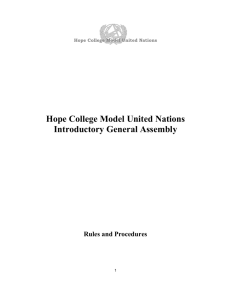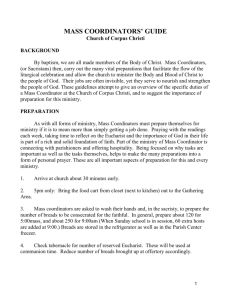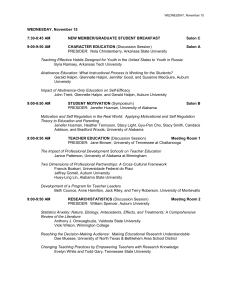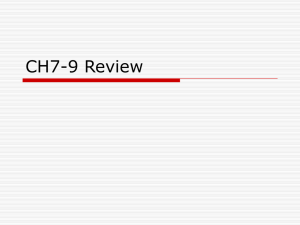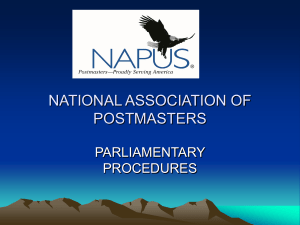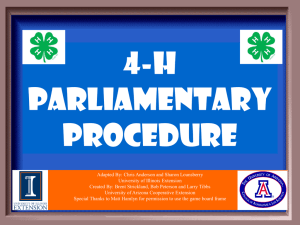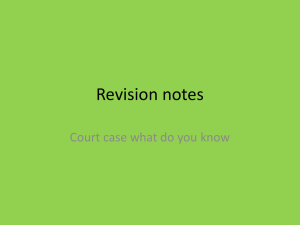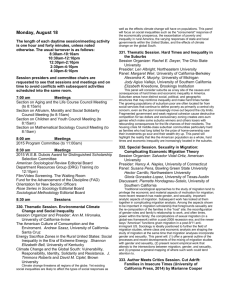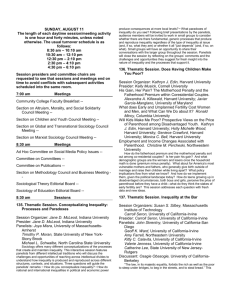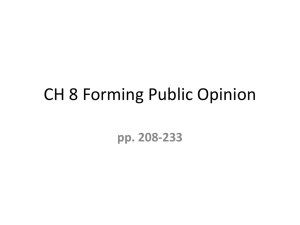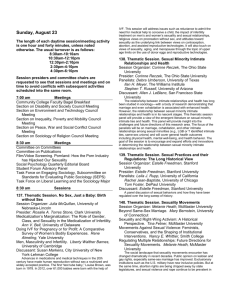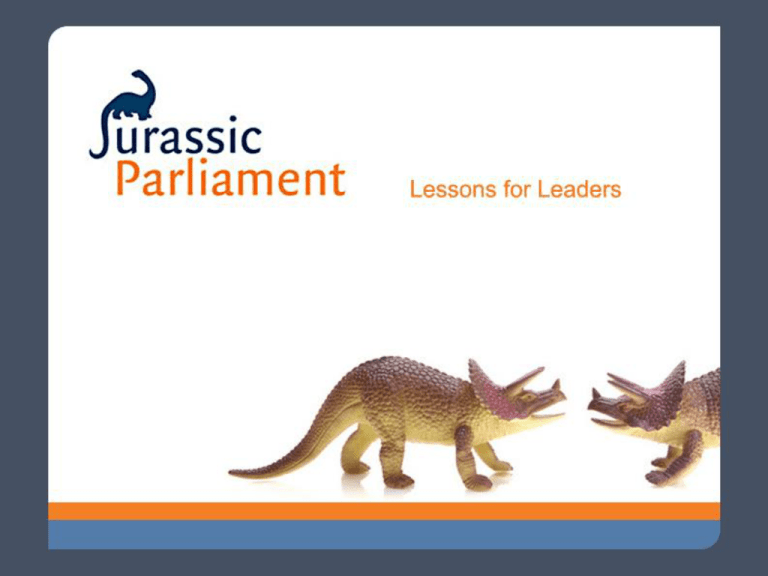
Robert’s Rules of Order in Action
Ann G. Macfarlane, CAE, PRP
Jurassic Parliament
Utah School Board Association
Salt Lake City, Utah
Friday, January 9, 2015
Accountability Hierarchy
BOSS
Accountability Hierarchy
BOSS
Voluntary Association
LEADER
Voluntary Association
LEADER
Three Duties of Leader
• Manage or administer the association
• Lead the association
• Preside at the association’s meetings
What Is Your Authority?
All members of a governing board share in a joint and
collective authority which exists and can be exercised
only when the group is in session.
The Standard Code of Parliamentary Procedure
Point of Order
• A motion claiming that a mistake has been made.
• Can be made only by a member. (We recommend authorizing
staff to do this also.)
• Must be timely.
• May interrupt a speaker if necessary.
Example
Member A: Madam President, I rise to a point of order.
President: State your point.
Member A: My esteemed colleague has used the term “creamfaced loon” in referring to the Secretary. According to Robert’s
Rules, insults are not allowed in debate.
President: The point is well taken. Members will refrain from
using improper language.
Timeliness
•
•
•
•
Must be timely.
May be raised up until the next item of business is taken up.
If you wait, it will be too late.
There are a very few exceptions, but they are rare.
Principle of Equality
All members have equal rights, privileges and
obligations.
How is this right exercised?
“No one may speak a second time until everyone who
wishes to do so has spoken once.”
The most neglected rule in all of Robert’s Rules of
Order!
Why don’t we follow this rule?
• Boards tend to discuss their affairs in conversational
mode.
• In conversations, dominant people tend to dominate,
• And agreeable people tend to let them.
• Must have a structure to make sure that everyone
has an equal chance to speak.
• This is both fair and efficient.
HOW to do this?
• Members must seek recognition from the presider before
speaking.
• Members must address their remarks to the presider, NOT TO
EACH OTHER.
• If someone fails to do this, a point of order should be raised.
• Presider should keep track of who has spoken and who is
requesting to speak.
• Alternately, may ask vice-chair to do so.
Amendments
• Amendments are proposed in order to improve the motion.
• They may be made at any time during debate.
• The group votes on the amendment BEFORE voting on the
main motion. This is in order to “perfect” the motion, to make
it as good as it can be.
• Once the fate of the amendment has been decided, debate
continues on the main motion.
• Don’t forget to vote on the main motion “as amended.”
A great method – the “round robin”
• The chair goes around the table, asking each person in turn
for their opinion. People may pass.
• Important to have a pencil in hand, to jot down points or
questions for when your turn arrives.
• Chair must wait his turn also!
• This rule applies to questions and answers also, and to
discussions with staff.
• Don’t let any two people “hijack” the meeting.
Benefits
• We get everyone’s input, not just that of the extroverts.
• We are open to creative and dissident opinion that may offer
great value to the organization.
• We avoid a situation where people “trim their sails to the
prevailing winds.”
• We counteract the dead hand of “social cohesion.”
• We lessen the chance of “groupthink.”
“Exploratory Round Robin”
• One further tweak – everyone agrees not to offer
amendments or other motions during the first round.
• The first round becomes an information-gathering step.
• Staff notes comments or questions on a whiteboard.
• This prevents the discussion from being drawn off-track by
proposed amendments or other motions.
• Gives the entire picture of the group’s members’ views.
Discussion Sheet
+
Δ
?
Appealing a Point of Order
Member A: Madam President, I rise to a point of order.
President: State your point.
Member A: My esteemed colleague has used the term “creamfaced loon” in referring to the Secretary. According to Robert’s
Rules, insults are not allowed in debate.
President: The point is well taken. Members will refrain from
using improper language.
Example
Member B: Madam President, I appeal the point of order on the
grounds that “cream-faced loon” is a literary reference and not
an insult.
Member C: Second!
Presider: Very well, since the ruling of the chair has been
appealed, the group will decide. Note that appeals pertaining to
proper use of language and decorum may not be debated.
Example
Presider: All those who believe that “cream-faced loon” is an
insult, please say “aye.”
[Members vote]
Presider: All those who believe that this phrase is not an insult,
please say “no.”
[Members vote]
Note that the question being voted on is, “Shall the decision of
the presider be upheld?”
Example
[If the ayes have it]
Presider: The ayes have it, the ruling of the chair is upheld, and
members will refrain from using this term.
[If the noes have it]
Presider: The noes have it, the ruling of the chair is not upheld,
and members may use this term.
Flow of Authority at a Meeting
The group adopts its rules and guidelines.
↓
In attending, members accept the rules of the group.
↓
During meetings, the presiding officer applies the rules for the benefit of the
group.
↓
All persons present at a meeting have an obligation to obey the legitimate
orders of the presiding officer.
↓
Flow of Authority at a Meeting
Any member who disagrees with a ruling, decision or order by the presiding
officer may appeal the ruling.
↓
If another member seconds the appeal, the group will decide by majority
vote whether the ruling, decision or order is legitimate.
↓
The presiding officer obeys the group’s decision.
Role of the Presider
• Robert has special rules for small boards.
• In a small board, up to about 12 people, the presider may take
part in discussion and may vote (if bylaws do not say
otherwise).
• Nevertheless, presider must exercise restraint.
Central paradox
• The presider is the most important person in the room, AND
the least important person in the room.
• The presider must be strict on process – a “benevolent
dictator.”
• The presider is not responsible for the decision that the group
makes.
• The presider is the servant of the group, and the group is the
final authority.
HOW to do this?
•
•
•
•
•
Know the rules and practice the verbiage.
Speak firmly and definitely.
Interrupt people who are breaking the rules.
Use a loud voice when you have to.
Keep an emotional connection with the group.
Point of Information
• This is a request for information that is timely and relevant to
the debate.
• Presider can respond three ways:
– Respond yourself
– Ask someone else to respond
– Say, “We’ll get back to you later.”
• Don’t allow people to GIVE information. You may ask, “What
information does the member need in order to decide how to
vote?”
Unacceptable Remarks
1.
2.
3.
4.
5.
Personal remarks
Discourteous remarks – insulting language, attacks
Inflammatory language
Referring to another member’s motives
Criticizing past actions of the group (unless subject is under
discussion, or about to propose a change)
6. Remarks that are not germane (relevant) to the discussion
Role of the Members
• If directors are to exercise their “duty of care,” they must
claim their own authority and not give too much to the leader.
• We are all subject to doubt, deference, and the dread of being
different.
• In a healthy organization, members can express a differing
opinion and still be welcome. Members know how to be clear
about their views, while still staying connected to each other
and the organization.
HOW to do this?
• Understand your role and responsibility.
• Be prepared to speak up when you have a concern, spot a
discrepancy, or think of a question.
• Explain “point of order” and “appeal” to your colleagues and
your leader, and use them.
• Remember your fiduciary duty and the personal liability you
carry as a consequence of having accepted service.
Thomas Jefferson said it best…
An association of men who will not quarrel with one
another is a thing which has never yet existed, from the
greatest confederacy of nations down to a town
meeting or a vestry.
Robert’s Rules to the rescue!
• When everyone understands the rules and
procedures, things go smoothly.
• Minority expresses its views, does its best to
convince colleagues, but accepts the decision of the
majority, in the democratic spirit, as the decision of
the whole group. This is the American way.
The best leader is one whose existence is barely known.
Next best is one who is loved and praised.
Next is one who is feared.
Worst of all is a leader who is despised.
If you fail to trust people, they won’t turn out to be trustworthy.
Therefore, guide others by quietly relying on Tao.
Then, when the work is done, the people can say,
“We did this ourselves.”
From the Tao te Ching of Lao Tzu, translated by Brian Browne Walker
Robert’s Rules in Action
© Jurassic Parliament 2015. All rights reserved.
PO Box 77553, Seattle, WA 98177
Tel: 206-542-8422
Email: ann@jurassicparliament.com Web: www.jurassicparliament.com

